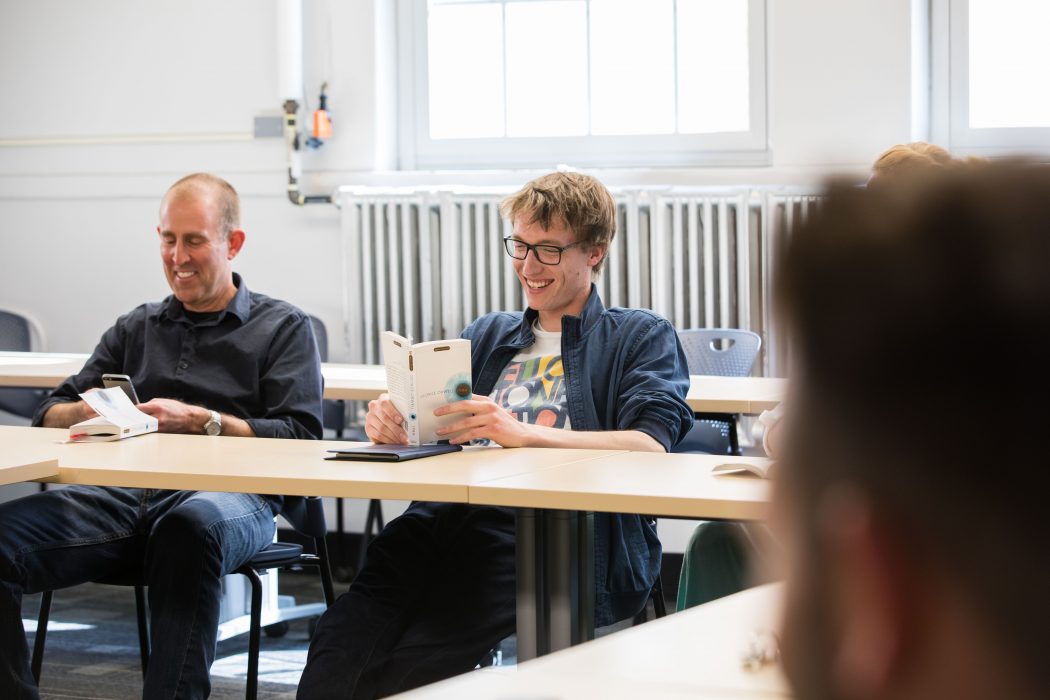New reading group explores links between dystopian fiction and reality
Students and faculty at Utah State University are meeting together in a new reading group to discuss dystopian novels and how they relate to today’s political climate.
The group is the brainchild of Dr. Brian McCuskey, an associate professor in the English department. Following President Donald Trump’s inauguration in January, the novel “1984,” by George Orwell, rose to the top of Amazon’s best-seller list. McCuskey said he thought it would be interesting to discuss this phenomenon with faculty and students and think about possible reasons for its sudden rise in popularity.
During the spring 2017 semester, the Student-Faculty Reading Group met in the Ray B. West building every other Friday from 3:30 to 4:30 to discuss “1984.” McCuskey wanted to avoid using the term “club,” as both faculty and students were invited and he wanted participants to feel they were all on equal ground.
Group participant Brittney McDonald said she liked the group’s format because she felt the faculty and students had “equal footing” in the discussion.
“Its purpose is to have fun talking about the novel, asking questions about its story and characters and connecting its themes to current events,” McCuskey said.
McCuskey is particularly interested in dystopian novels such as “1984.”
“Dystopian novels are entertaining fantasies of worst-case scenarios, which usually involve a toxic mix of authoritarian governments, repressive societies and invasive technologies,” McCuskey said. “Set in the future, they give us a critical distance on current events, while also warning that our present may be heading toward that future.”
McCuskey said he thinks people responded well to the group. A dozen or more people have consistently attended throughout the semester to have a “lively, thoughtful discussion,” McCuskey said.
In the most recent group meeting, group participants discussed how the themes of “1984” connect to current events.
“It’s a little hard to read this chapter where they’re talking about declaring war,” McCuskey said during the group discussion, “and then you get up and read that, yesterday, we were never going to bomb Syria, but today, we’re going to bomb Syria. The speed at which these decisions are being made is so reminiscent of what’s going on in the novel.”
McCuskey said though people can discuss world events such as war, he is not sure what to do about them other than point them out and make them known.
“Is having a reading group enough?” he said during the discussion. “If this is a resistance, we are in trouble!”
“Are we the Brotherhood?” Liz Pack, a group participant, said jokingly in reference to the novel.
Pack believes that novels like “1984” ask readers important questions about the world, to which the reader has to find his or her own answers. Near the discussion’s end, she said, “What do we want a book to give us? Do we want it to give us answers or questions?”
Group participants such as McDonald and Pack are glad to have this group as an outlet for thoughtful discussion.
“We’re not alone. There are people who are thinking,” McDonald said. “There is a core of individuals who know and can articulate these questions to change things.”
“They’re willing to go out and find things to read, to talk about,” Pack said.
McCuskey said the group is open to all faculty and students, regardless of major.
“We read. How can you get better than that?” McDonald said.
The group has concluded its meetings for the spring semester and will resume in the fall 2017 semester to discuss “The Handmaid’s Tale,” by Margaret Atwood.
@melodyj300
Photo by Matt Halton


It is so great that people are willing to get together to have a real conversation. I am very impressed. Way to go USU!